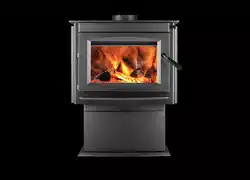Loading ...
Loading ...
Loading ...

W415-2796 / D / 05.07.21
EN
14
installation
3.1.1 chimney connection
Your chimney connector and chimney must have the same diameter as the appliance’s exhaust flue outlet. The
appliance pipe must be made of aluminized or cold roll steel with a minimum 24 gauge (0.6mm) thickness. It is
strictly forbidden to use galvanized steel.
A 6” (152.4mm) diameter single or double wall chimney connector, used to connect the appliance to the chimney,
must be installed with the crimped end toward the appliance. This will ensure that the moisture which condenses
from the burning wood will flow back into the fire chamber. Each joint in the chimney connector must be secured
with at least three sheet metal screws, equally spaced around the circumference.
For installation of your chimney connector, the following recommendations may be useful:
• The chimney connector must be short and straight. For optimum performance, it is recommended that all
horizontal runs have a minimum 1/4” (6mm) rise per foot (0.3m), with the higher end of the section toward the
chimney. For safe and proper operation of the appliance, see the “installation” section.
• To ensure a good draft, the total horizontal length of the connector should never exceed 8’ (2.4m) to 10’
(3.1m). In the case of vertical installation, the total length of the connector can be longer and connected
without problem to the chimney at the ceiling level.
• There should never be more than two 90° elbows in the entire connector and chimney system. Never start
with a 90° elbow. Always go up vertically for at least 2 feet (0.6m) from the flue collar before using a 90°
elbow.
• The connector must not pass through any combustible material, nor may it pass through a concealed
space (such as an attic, roof space, or closet). If passing through a wall, ceiling or into a masonry chimney,
use either chimney components listed for that specific use, or means acceptable to local authorities having
jurisdiction over the installation.
This appliance must be connected to:
A. A chimney complying with the requirements for Type HT
chimneys in the Standard for Chimneys, Factory-Built,
Residential Type and Building Heating Appliance
OR
B. A code-approved masonry chimney with a flue liner. Vent
the stove into a masonry chimney or an approved, insulated
solid-fuel stainless-steel chimney with as short and straight a
length of 6” (152mm) diameter chimney connector as possible.
Connection to a masonry thimble cemented in place.
TOWARD
APPLIANCE
FLUE GAS
DIRECTION
MALE END OF
CONNECTOR
OR CHIMNEY
PIPE
Loading ...
Loading ...
Loading ...
